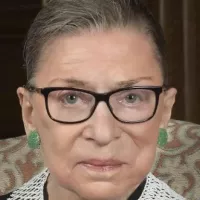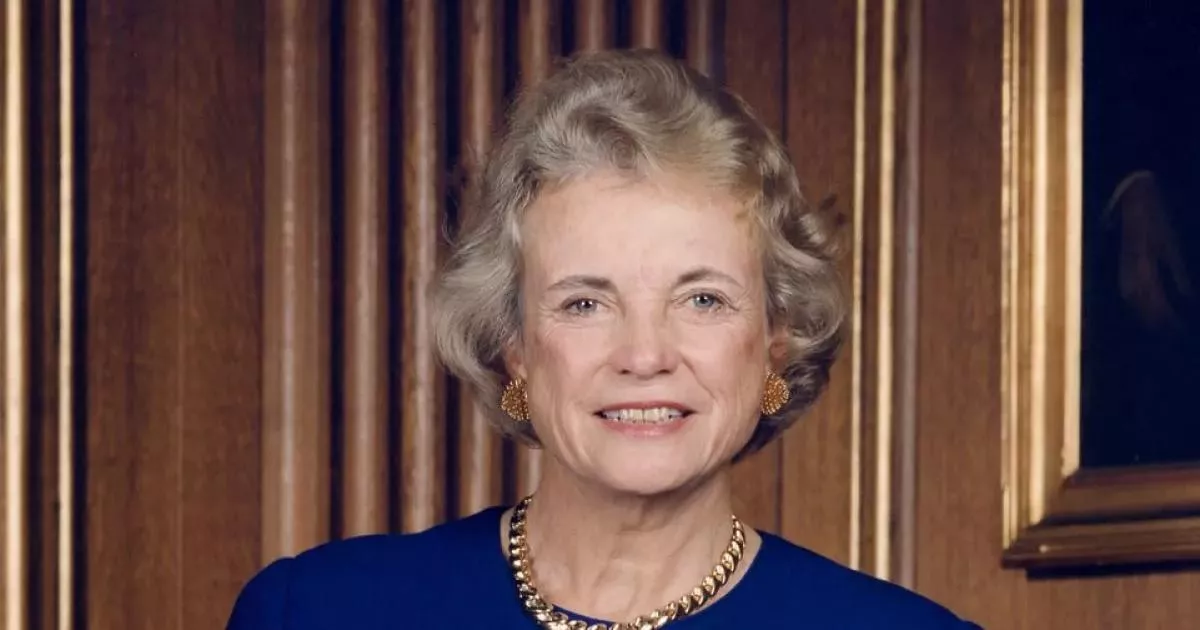Sandra Day O'Connor was a pioneering American jurist who served as the first female Associate Justice of the Supreme Court of the United States from 1981 to 2006. Appointed by President Ronald Reagan, she was unanimously confirmed by the Senate. Prior to her Supreme Court tenure, O'Connor served as an Arizona state judge and legislator, becoming the first female majority leader of a state senate. Often described as a moderate conservative, she frequently acted as a swing vote on the Court, playing a crucial role in many landmark decisions.
March 26, 1930: Sandra Day O'Connor Born
On March 26, 1930, Sandra Day O'Connor was born in El Paso, Texas. She later became the first female U.S. Supreme Court justice.
1946: Graduated High School
In 1946, Sandra Day O'Connor graduated sixth in her class at Austin High School in El Paso.
1950: Graduation from Stanford University
In 1950, Sandra Day graduated magna cum laude with a B.A. in economics from Stanford University. She also dated William Rehnquist in 1950.
1951: Marriage Proposal
In 1951, William Rehnquist proposed marriage to Sandra Day O'Connor in a letter, but she did not accept it.
December 20, 1952: Marriage to John Jay O'Connor III
On December 20, 1952, Sandra Day O'Connor married John Jay O'Connor III at her family's ranch.
1952: Graduation from Stanford Law School
In 1952, Sandra Day O'Connor graduated from Stanford Law School.
1952: Employment as Deputy County Attorney
In 1952, after graduating from law school, Sandra Day O'Connor found employment as a deputy county attorney in San Mateo, California.
1958: Birth of Son Scott
In 1958, Sandra Day O'Connor and her husband had their first son, Scott.
1960: Birth of Son Brian
In 1960, Sandra Day O'Connor and her husband had their second son, Brian.
1962: Birth of Son Jay
In 1962, Sandra Day O'Connor and her husband had their third son, Jay.
1964: Goldwater Campaign
In 1964, Sandra Day O'Connor served on Arizona Senator Barry Goldwater's presidential campaign.
1965: Assistant Attorney General of Arizona
From 1965 to 1969, Sandra Day O'Connor served as assistant Attorney General of Arizona.
1969: Appointment to Arizona Senate
In 1969, the governor of Arizona appointed Sandra Day O'Connor to fill a vacancy in the Arizona Senate.
1970: Vote on Abortion Bill
In 1970, Sandra Day O'Connor cast a preliminary vote in the Arizona State Senate in favor of a bill to repeal the state's criminal-abortion statute.
1973: First Female Majority Leader
By 1973, Sandra Day O'Connor became the first woman to serve as Arizona's or any state's majority leader in the Senate.
1974: Opinion on Abortion Measure
In 1974, Sandra Day O'Connor opined against a measure to prohibit abortions in some Arizona hospitals.
1974: Appointment to Maricopa County Superior Court
In 1974, Sandra Day O'Connor was appointed to the Maricopa County Superior Court.
1975: Served on Maricopa County Superior Court
From 1975 to 1979, Sandra Day O'Connor served on the Maricopa County Superior Court.
1977: Presided Over Assault Case
In late 1977 and early 1978, Sandra Day O'Connor presided over an aggravated assault case against Clarence Dixon.
1978: Presided Over Assault Case
In late 1977 and early 1978, Sandra Day O'Connor presided over an aggravated assault case against Clarence Dixon.
1979: Elevated to Arizona Court of Appeals
In 1979, Sandra Day O'Connor was elevated to the Arizona Court of Appeals.
1980: Reagan's Pledge
During his 1980 presidential campaign, Ronald Reagan pledged to appoint the first woman to the Court.
1980: Reagan Coalition Support
In 1980, the Christian right element in the Reagan coalition supported him, believing he would appoint Supreme Court justices to overturn Roe v. Wade. They were surprised when O'Connor was his first appointment, fearing she would tolerate abortion.
July 6, 1981: Reagan Chooses O'Connor
On July 6, 1981, President Reagan informed Judge O'Connor that she was his nominee for the Supreme Court, sparking controversy among his supporters.
July 7, 1981: Nomination Announcement
On July 7, 1981, President Ronald Reagan announced that he would nominate Sandra Day O'Connor as an associate justice of the Supreme Court.
August 19, 1981: Formal Nomination
On August 19, 1981, President Reagan formally nominated Sandra Day O'Connor.
September 9, 1981: Confirmation Hearing Begins
On September 9, 1981, Sandra Day O'Connor's confirmation hearing before the Senate Judiciary Committee began, marking the first televised confirmation hearing for a Supreme Court justice.
1981: Appointed to Supreme Court
In 1981, Sandra Day O'Connor was appointed as an associate justice of the Supreme Court of the United States.
1983: City of Akron v. Akron Center for Reproductive Health
In 1983, O'Connor dissented in City of Akron v. Akron Center for Reproductive Health, criticizing Roe v. Wade's "trimester approach".
1983: Opinion on Drug-Sniffing Dogs
In a 1983 opinion upholding searches by drug-sniffing dogs, O'Connor recognized that a search is most likely to be considered constitutionally reasonable if it is very effective at discovering contraband without revealing innocent but embarrassing information.
1984: Strickland v. Washington
In 1984 O'Connor wrote the opinion for Strickland v. Washington, which was later highlighted at a 2007 conference.
1986: Thornburgh v. American College of Obstetricians and Gynecologists
In 1986, O'Connor criticized Roe v. Wade in Thornburgh v. American College of Obstetricians and Gynecologists, disputing the Court's attempt to discredit state abortion regulation.
1987: McCleskey v. Kemp Decision
In 1987, O'Connor joined a 5-4 majority in McCleskey v. Kemp, upholding the death penalty for an African American man despite statistical evidence of racial bias in death penalty sentencing.
1988: Treated for breast cancer and had appendix removed
In 1988, Sandra Day O'Connor was successfully treated for breast cancer and also had her appendix removed. Her husband also left his law firm the same year.
1989: Webster Case Deliberations
In 1989, during deliberations over the Webster case, O'Connor stated she would not overrule Roe v. Wade.
1990: Sister in Arizona Legislature
From 1990 to 2000, Sandra Day O'Connor's sister, Ann Day, was a member of the Arizona Legislature.
1990: Hodgson v. Minnesota Vote
In 1990, O'Connor voted in favor of striking down restrictions on abortion for the first time in Hodgson v. Minnesota.
1990: Missouri v. Jenkins Ruling
In the 1990 Missouri v. Jenkins ruling, O'Connor voted with the majority that Federal district courts had no authority to require the state of Missouri to increase school funding to counteract racial inequality.
1991: Freeman v. Pitts Case
In the 1991 case Freeman v. Pitts, O'Connor joined a concurring opinion agreeing that a school district formerly under judicial review for racial segregation could be freed of this review, even if not all desegregation targets had been met.
1992: Planned Parenthood v. Casey Ruling
In 1992, O'Connor used a test she had developed to limit the holding of Roe v. Wade in Planned Parenthood v. Casey, allowing states to enact abortion measures that did not place an "undue burden" on a woman's right.
1992: Didn't Join Thomas's Dissents
In the 1992 term, Sandra Day O'Connor did not join a single one of Justice Thomas's dissents, indicating a divergence in their judicial views.
1993: Ruth Bader Ginsburg Joins Supreme Court
In 1993, Ruth Bader Ginsburg became the second female Supreme Court justice, relieving Sandra Day O'Connor from some media attention.
1993: Precedent setting opinion
O'Connor authored an opinion in 1993 that set precedent for the 1996 ruling in Shaw v. Hunt and Shaw v. Reno.
1994: Joined Conservative Bloc
From 1994 to 2004, Sandra Day O'Connor joined the traditional conservative bloc of Rehnquist, Scalia, Kennedy, and Thomas 82 times.
1995: Rosenberger v. University of Virginia Vote
In 1995, O'Connor voted in favor of religious institutions in the case of Rosenberger v. University of Virginia.
1995: Missouri v. Jenkins Ruling
In the 1995 Missouri v. Jenkins ruling, O'Connor voted with the majority that Federal district courts had no authority to require the state of Missouri to increase school funding to counteract racial inequality.
1996: Shaw v. Hunt and Shaw v. Reno
In 1996, O'Connor joined a Rehnquist opinion in Shaw v. Hunt and Shaw v. Reno, striking down an electoral districting plan designed to facilitate the election of Black representatives from North Carolina.
1996: Board of County Commissioners, Wabaunsee County, Kansas v Umbehr
In 1996, O'Connor upheld the application of first amendment free speech rights to independent contractors working for public bodies in Board of County Commissioners, Wabaunsee County, Kansas v Umbehr.
1998: Voting Alignment with Rehnquist
Sandra Day O'Connor's alignment with Rehnquist ranged from 93.4% to 63.2% until 1998, hitting above 90% in three of those years.
December 12, 2000: Report on Retirement Reluctance
On December 12, 2000, it was reported that O'Connor was reluctant to retire with a Democrat in the presidency, as mentioned by her husband, John O'Connor.
2000: Sister in Arizona Legislature
From 1990 to 2000, Sandra Day O'Connor's sister, Ann Day, was a member of the Arizona Legislature.
2000: Mitchell v. Helms Vote
In 2000, O'Connor voted in favor of religious institutions in the case of Mitchell v. Helms.
2000: Bush v. Gore Opinion
In 2000, Sandra Day O'Connor contributed to the per curiam majority opinion in Bush v. Gore.
2000: Expressed regret over Bush v. Gore case
In 2000, Sandra Day O'Connor reflected on her time on the Supreme Court and expressed regret that the Court heard the Bush v. Gore case, stating it "stirred up the public" and "gave the Court a less-than-perfect reputation."
2001: Dixon Arrested
In 2001, Clarence Dixon was arrested after DNA evidence identified him in the murder of Deana Lynne Bowdoin.
2001: Dissent in Fourth Amendment Case
In a 2001 case, O'Connor dissented, emphasizing that needless humiliation of an individual is an important factor in determining Fourth Amendment reasonableness, according to professor Andrew Taslitz.
2002: Zelman v. Simmons-Harris Vote
In 2002, O'Connor voted in favor of religious institutions in the case of Zelman v. Simmons-Harris.
2002: Lazy B: Growing up on a Cattle Ranch
In 2002, Sandra Day O'Connor and her brother, H. Alan Day, wrote "Lazy B: Growing up on a Cattle Ranch in the American Southwest" about their childhood experiences.
2003: Grutter v. Bollinger Opinion
In 2003, O'Connor authored the majority Supreme Court opinion in Grutter v. Bollinger, stating that racial affirmative action should not be constitutional permanently, but long enough to correct past discrimination.
2003: The Majesty of the Law Published
In 2003, O'Connor wrote a book titled The Majesty of the Law: Reflections of a Supreme Court Justice.
2004: Joined Conservative Bloc
From 1994 to 2004, Sandra Day O'Connor joined the traditional conservative bloc of Rehnquist, Scalia, Kennedy, and Thomas 82 times.
February 22, 2005: Presided Over Oral Arguments
On February 22, 2005, Sandra Day O'Connor became the first woman to preside over oral arguments before the Supreme Court in the case of Kelo v. City of New London.
July 1, 2005: Retirement Announcement
On July 1, 2005, Sandra Day O'Connor announced her retirement from the Supreme Court, which would be effective upon the confirmation of her successor.
October 3, 2005: Bush Nominates Miers
On October 3, 2005, President Bush nominated White House Counsel Harriet Miers to replace O'Connor as Associate Justice of the Supreme Court.
October 2005: Alito Nominated
In October 2005, Samuel Alito was nominated to take Sandra Day O'Connor's seat on the Supreme Court.
2005: Speculation on Court Vacancies
By 2005, the Court's composition had been unchanged for eleven years, and there was speculation about Rehnquist's or O'Connor's possible retirement.
2005: Views on Church and State
In 2005, Barry Lynn commented on O'Connor's approach to church-state issues, noting her conservative stance but also her respect for the country's religious diversity. Lynn stated O'Connor "saw the complexity of church-state issues and tried to choose a course that respected the country's religious diversity".
2005: Chico: A True Story Published
In 2005, O'Connor wrote a children's book, Chico: A True Story from the Childhood of the First Woman Supreme Court Justice, about her childhood.
2005: Elected as honorary fellow and became Chancellor of the College of William & Mary
In 2005, Sandra Day O'Connor was elected as an honorary fellow of the National Academy of Public Administration, and accepted the role of the 23rd Chancellor of the College of William & Mary.
January 31, 2006: Samuel Alito Joins Supreme Court
On January 31, 2006, Samuel Alito joined the Supreme Court, taking the seat that was vacated by Sandra Day O'Connor.
March 2006: Speech on Judicial Independence
During a speech at Georgetown University in March 2006, O'Connor spoke on the issue of judicial independence, warning against political attacks on the courts.
April 5, 2006: Arizona State University named its law school the Sandra Day O'Connor College of Law
On April 5, 2006, Arizona State University named its law school the Sandra Day O'Connor College of Law in her honor.
May 15, 2006: Delivered commencement address at William & Mary School of Law
On May 15, 2006, Sandra Day O'Connor gave the commencement address at the William & Mary School of Law, where she said that judicial independence is "under serious attack at both the state and national level".
2006: Joined Iraq Study Group and Board of the Rockefeller Foundation
In 2006, Sandra Day O'Connor was appointed to the Iraq Study Group and became a trustee on the board of the Rockefeller Foundation.
2006: End of Supreme Court Tenure
In 2006, Sandra Day O'Connor's tenure as an associate justice of the Supreme Court of the United States came to an end.
November 7, 2007: Conference on Strickland v. Washington
On November 7, 2007, at a conference on her landmark opinion in Strickland v. Washington, O'Connor highlighted the lack of proper legal representation for poor defendants and urged merit selection for judges.
2007: Chaired the Jamestown 2007 celebration
In 2007, Sandra Day O'Connor chaired the Jamestown 2007 celebration, commemorating the 400th anniversary of the founding of the colony at Jamestown, Virginia, in 1607.
April 22, 2008: Named Harry Rathbun Visiting Fellow and gave lecture
On April 22, 2008, Sandra Day O'Connor was named an inaugural Harry Rathbun Visiting Fellow by the Office for Religious Life at Stanford University. She also gave "Harry's Last Lecture on a Meaningful Life".
August 7, 2008: Editorial on Anwar Ibrahim
On August 7, 2008, O'Connor and Abdurrahman Wahid co-authored an editorial in the Financial Times expressing concerns about the threatened imprisonment of Malaysian opposition leader Anwar Ibrahim.
October 2008: Spoke on racial equality in education and received the Charles Hamilton Houston Justice Award
In October 2008, Sandra Day O'Connor spoke on racial equality in education at a conference hosted by the Charles Hamilton Houston Institute for Race and Justice at Harvard Law School. Later in the conference, she was awarded the Charles Hamilton Houston Justice Award alongside Desmond Tutu and Dolores Huerta.
November 19, 2008: Essay on Judicial Accountability
On November 19, 2008, O'Connor published an introductory essay on judicial accountability in the Denver University Law Review, calling for better public understanding.
2008: Sat for cases with the 2nd, 8th, and 9th Circuits
By 2008, Sandra Day O'Connor, as a retired Supreme Court Justice, had sat for cases with the 2nd, 8th, and 9th Circuits as a visiting judge.
2008: The Sandra Day O'Connor Project on the State of the Judiciary held annual conferences
In 2006 through 2008, The Sandra Day O'Connor Project on the State of the Judiciary, named for O'Connor, held annual conferences on the independence of the judiciary.
February 2009: Launched "Our Courts" website
In February 2009, Sandra Day O'Connor launched "Our Courts", a website to offer interactive civics lessons to students and teachers.
March 3, 2009: Appeared on "The Daily Show"
On March 3, 2009, Sandra Day O'Connor appeared on the satirical television program "The Daily Show with Jon Stewart" to promote the "Our Courts" website.
August 2009: Added online interactive games to "Our Courts" website
In August 2009, the "Our Courts" website added two online interactive games.
2009: Founded the Sandra Day O'Connor Institute
In 2009, Sandra Day O'Connor founded the non-profit organization now known as the Sandra Day O'Connor Institute.
2009: Presidential Medal of Freedom
In 2009, Sandra Day O'Connor was awarded the Presidential Medal of Freedom by President Barack Obama.
2009: Husband's death and moved back to Phoenix
In 2009, Sandra Day O'Connor's husband passed away after suffering from Alzheimer's disease for nearly 20 years. After retiring from the Court, O'Connor moved back to Phoenix, Arizona.
May 2010: Warned Elena Kagan
In May 2010, Sandra Day O'Connor warned female Supreme Court nominee Elena Kagan about the "unpleasant" process of confirmation hearings.
May 2010: "Our Courts" initiative expanded, becoming iCivics
In May 2010, the "Our Courts" initiative expanded, becoming iCivics offering free lesson plans, games, and interactive videogames for middle and high school educators.
2011: Founding co-chair of National Advisory Board at the National Institute for Civil Discourse (NICD)
In 2011, Sandra Day O'Connor was a founding co-chair of the National Advisory Board at the National Institute for Civil Discourse (NICD).
2012: Ended role as Chancellor of the College of William & Mary
In 2012, Sandra Day O'Connor concluded her role as the Chancellor of the College of William & Mary.
April 2013: Joined Justice at Stake as honorary chair
In April 2013, Sandra Day O'Connor joined Justice at Stake, a national judicial reform advocacy organization, as honorary chair.
2013: Friends and colleagues noticed she was becoming more forgetful and less talkative.
Around 2013, Sandra Day O'Connor's friends and colleagues noticed that she was becoming more forgetful and less talkative.
2013: Authored "Out of Order: Stories from the History of the Supreme Court"
In 2013, Sandra Day O'Connor wrote the book "Out of Order: Stories from the History of the Supreme Court."
September 17, 2014: Appeared on Jeopardy! and gave a talk on civics education
On September 17, 2014, Sandra Day O'Connor appeared on Jeopardy! and provided video answers. On the same day, she gave a talk alongside Justice David Souter about the importance of meaningful civics education.
October 2015: Hired a law clerk
In October 2015, Sandra Day O'Connor hired a law clerk for the term after having retired from the Supreme Court.
November 2015: Became trustee emeritus for the National Constitution Center
By November 2015, Sandra Day O'Connor had transitioned to being a trustee emeritus for the National Constitution Center in Philadelphia.
2015: iCivics games reached 72,000 registered teachers and 30 million plays
By 2015, the iCivics games had 72,000 teachers as registered users and its games had been played 30 million times.
February 2016: Argued for immediate replacement of Antonin Scalia
In February 2016, Sandra Day O'Connor argued in favor of President Barack Obama naming the replacement for Antonin Scalia, opposing Republican arguments to wait until the next president.
May 7, 2016: Younger sister killed in car accident
On May 7, 2016, Sandra Day O'Connor's younger sister, Ann Day, was killed in a car accident in Tucson, Arizona, as a result of a collision with a drunk driver.
2017: Back problems led her to use a wheelchair and move to an assisted living facility.
In 2017, back problems led Sandra Day O'Connor to use a wheelchair, and to her moving to an assisted living facility.
October 2018: Announced retirement from public life due to dementia diagnosis
In October 2018, Sandra Day O'Connor announced her effective retirement from public life after disclosing that she had been diagnosed with the early stages of Alzheimer's-like dementia.
2019: Former adobe residence listed on the National Register of Historic Places
In 2019, Sandra Day O'Connor's former adobe residence in Arizona, curated by the O'Connor Institute, was listed on the National Register of Historic Places.
2022: Dixon Executed
In 2022, Clarence Dixon was executed for the murder of Deana Lynne Bowdoin.
2022: Launched Civics for Life digital platform
In 2022, the Sandra Day O'Connor Institute launched Civics for Life, its multigenerational digital platform.
December 1, 2023: Sandra Day O'Connor's Death
On December 1, 2023, Sandra Day O'Connor, a retired Associate Justice of the Supreme Court, passed away.
December 18, 2023: Lay in repose in the Great Hall of the Supreme Court
On December 18, 2023, Sandra Day O'Connor lay in repose in the Great Hall of the Supreme Court.
Mentioned in this timeline

Barack Obama the th U S President - was the...

Ruth Bader Ginsburg was an American lawyer and Supreme Court...

The White House located at Pennsylvania Avenue NW in Washington...
California is a U S state on the Pacific Coast...

Jon Stewart is an American comedian writer producer director political...
Arizona is a landlocked state in the Southwestern U S...
Trending

56 minutes ago Lakers Seek to Unlock Ayton's Greatness While Hayes Shines, Exposing Unwanted Truth.

56 minutes ago Jrue Holiday NBA DFS picks, lineups, and player prop bets for February 24.

56 minutes ago Julius Randle's Injury Update: Chris Finch Comments, Randle Scores 18 in Loss
57 minutes ago Jaden McDaniels excels as scorer, boosting Timberwolves with underrated skills this year.

57 minutes ago NBA Southeast Notes Discuss Trades, Desmond Bane's Performance, and Wendell Carter Jr.

2 hours ago Space Force Upgrades, Battle Management, and Role in Raids Spark Resource Push
Popular

Jesse Jackson is an American civil rights activist politician and...

Susan Rice is an American diplomat and public official prominent...

Barack Obama the th U S President - was the...

Michael Joseph Jackson the King of Pop was a highly...

Bernie Sanders is a prominent American politician currently serving as...

XXXTentacion born Jahseh Dwayne Ricardo Onfroy was a controversial yet...
